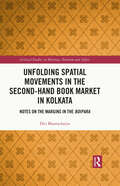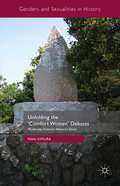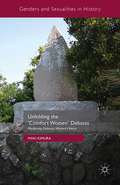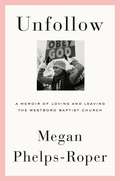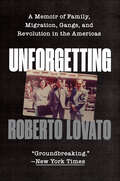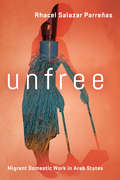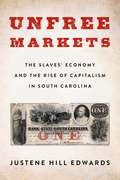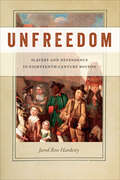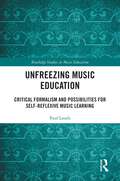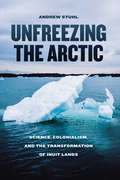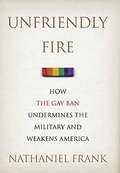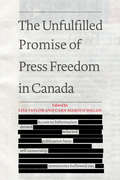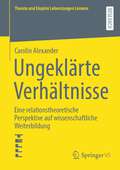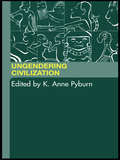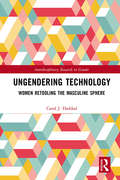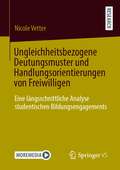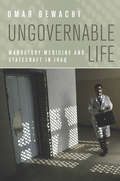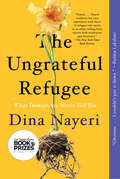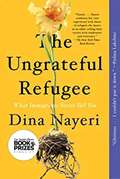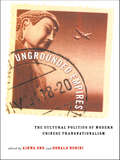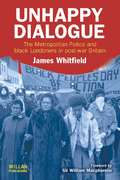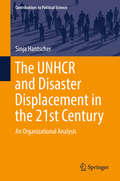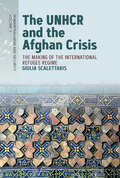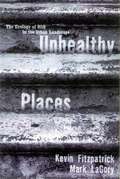- Table View
- List View
Unfolding Spatial Movements in the Second-Hand Book Market in Kolkata: Notes on the Margins in the Boipara (Critical Studies in Heritage, Emotion and Affect)
by Diti BhattacharyaThis insightful book unfolds the boipara, exploring the acts of thinking and writing about space and place in the context of recent key conversations at the intersections of cultural geographies, mobilities, materialities and heritage studies. This book reconsiders how we can think about space, place and spatialisation using the book market as a case study. Focusing on everyday lived and imagined experiences within the space, it provides insights into the intricacies, complexities and mobilities involved in the many ways in which temporal, material, structural and sensorial experiences of spaces are inter-implicated. As expression and method, this work aims to be a writing of space (rather than a writing about space) produced through the interleafing of the author’s lived spatial experience of the boipara with the stories, experiences and memories of other regulars who have used and continue to use it, along with the non-human materialities and mobilities that characterise it. This book is essential reading for a wide international audience, particularly those interested in the evolving discussions on mobility, or writing about space and place, materiality, assemblage theory and heritage spaces in the South Asian context.
Unfolding the ‘Comfort Women’ Debates: Modernity, Violence, Women's Voices (Genders And Sexualities In History)
by Maki KimuraUnfolding the ‘Comfort Women’ Debates.
Unfolding the ‘Comfort Women’ Debates: Modernity, Violence, Women's Voices (Genders and Sexualities in History)
by Maki KimuraThis study offers a fresh perspective on the 'comfort women' debates. It argues that the system can be understood as the mechanism of the intersectional oppression of gender, race, class and colonialism, while illuminating the importance of testimonies of victim-survivors as the site where women recover and gain their voices and agencies.
Unfollow: A Memoir of Loving and Leaving the Westboro Baptist Church
by Megan Phelps-RoperAt the age of five, Megan Phelps-Roper carried signs protesting homosexuality and other alleged vices alongside fellow members of the Westboro Baptist Church in Topeka, Kansas. As she grew, she watched the church--an enterprise consisting almost entirely of her immediate relatives--expand its activities. It became notorious for picketing soldiers' funerals and celebrating death and tragedy, causing the BBC to label the Phelpses "the most hated family in America." For Megan, however, Westboro was a source of comfort and inspiration. She admired the congregation's familial warmth and religious zeal. And as the church's Twitter spokesperson, she mastered its messaging--skillfully expounding upon pop culture, current events, and all the reasons "God Hates Your Feelings." Her grandfather, the church's founding minister, regarded her as a "jewel." But Megan's Twitter evangelizing triggered a remarkable transformation. As she jousted with online critics, observed church members mistreating one another, and tried to make sense of her own evolving beliefs and desires, she started to question her mission. Soon, she was exchanging messages with a man who would help change her life. A gripping memoir of escaping extremism and falling in love, Unfollow relates Megan's painful departure from Westboro and how she replaced the dogmas she had absorbed with a new community. The tale of her moral awakening is rich with suspense and thoughtful reflection, exposing the dangers of black-and-white thinking--and illuminating a possible way out of our age of angry polarization.
Unforgetting: A Memoir of Family, Migration, Gangs, and Revolution in the Americas
by Roberto LovatoAn LA Times Best Book of the Year • A New York Times Editors' Pick • A Newsweek 25 Best Fall Books • A The Millions Most Anticipated Book of the Year"Gripping and beautiful. With the artistry of a poet and the intensity of a revolutionary, Lovato untangles the tightly knit skein of love and terror that connects El Salvador and the United States." —Barbara Ehrenreich, author of Natural Causes and Nickel and DimedAn urgent, no-holds-barred tale of gang life, guerrilla warfare, intergenerational trauma, and interconnected violence between the United States and El Salvador, Roberto Lovato’s memoir excavates family history and reveals the intimate stories beneath headlines about gang violence and mass Central American migration, one of the most important, yet least-understood humanitarian crises of our time—and one in which the perspectives of Central Americans in the United States have been silenced and forgotten. The child of Salvadoran immigrants, Roberto Lovato grew up in 1970s and 80s San Francisco as MS-13 and other notorious Salvadoran gangs were forming in California. In his teens, he lost friends to the escalating violence, and survived acts of brutality himself. He eventually traded the violence of the streets for human rights advocacy in wartime El Salvador where he joined the guerilla movement against the U.S.-backed, fascist military government responsible for some of the most barbaric massacres and crimes against humanity in recent history. Roberto returned from war-torn El Salvador to find the United States on the verge of unprecedented crises of its own. There, he channeled his own pain into activism and journalism, focusing his attention on how trauma affects individual lives and societies, and began the difficult journey of confronting the roots of his own trauma. As a child, Roberto endured a tumultuous relationship with his father Ramón. Raised in extreme poverty in the countryside of El Salvador during one of the most violent periods of its history, Ramón learned to survive by straddling intersecting underworlds of family secrets, traumatic silences, and dealing in black-market goods and guns. The repression of the violence in his life took its toll, however. Ramón was plagued with silences and fits of anger that had a profound impact on his youngest son, and which Roberto attributes as a source of constant reckoning with the violence and rebellion in his own life.In Unforgetting, Roberto interweaves his father’s complicated history and his own with first-hand reportage on gang life, state violence, and the heart of the immigration crisis in both El Salvador and the United States. In doing so he makes the political personal, revealing the cyclical ways violence operates in our homes and our societies, as well as the ways hope and tenderness can rise up out of the darkness if we are courageous enough to unforget.
Unfree: Migrant Domestic Work in Arab States
by Rhacel Salazar ParreñasA stirring account of the experiences of migrant domestic workers, and what freedom, abuse, and power mean within a vast contract labor system. In the United Arab Emirates, there is an employment sponsorship system known as the kafala. Migrant domestic workers within it must solely work for their employer, secure their approval to leave the country, and obtain their consent to terminate a job. In Unfree, Rhacel Salazar Parreñas examines the labor of women from the Philippines, who represent the largest domestic workforce in the country. She challenges presiding ideas about the kafala, arguing that its reduction to human trafficking is, at best, unproductive, and at worst damaging to genuine efforts to regulate this system that impacts tens of millions of domestic workers across the globe. The kafala system technically renders migrant workers unfree as they are made subject to the arbitrary authority of their employer. Not surprisingly, it has been the focus of intense scrutiny and criticism from human rights advocates and scholars. Yet, contrary to their claims, Parreñas argues that most employers do not abuse domestic workers or maximize the extraction of their labor. Still, the outrage elicited by this possibility dominates much of public discourse and overshadows the more mundane reality of domestic work in the region. Drawing on unparalleled data collected over 4 years,this book diverges from previous studies as it establishes that the kafala system does not necessarily result in abuse, but instead leads to the absence of labor standards. This absence is reflected in the diversity of work conditions across households, ranging from dehumanizing treatment, infantilization, to respect and recognition of domestic workers. Unfree shows how various stakeholders, including sending and receiving states, NGOs, inter-governmental organizations, employers and domestic workers, project moral standards to guide the unregulated labor of domestic work. They can mitigate or aggravate the arbitrary authority of employers. Parreñas offers a deft and rich portrait of how morals mediate work on the ground, warning against the dangers of reducing unfreedom to structural violence.
Unfree Labor: American Slavery and Russian Serfdom
by Peter KolchinTwo massive systems of unfree labor arose, a world apart from each other, in the late sixteenth and early seventeenth centuries. The American enslavement of blacks and the Russian subjection of serfs flourished in different ways and varying degrees until they were legally abolished in the mid-nineteenth century. Historian Peter Kolchin compares and contrasts the two systems over time in this magisterial book, which clarifies the organization, structure, and dynamics of both social entities, highlighting their basic similarities while pointing out important differences discernible only in comparative perspective. These differences involved both the masters and the bondsmen. The independence and resident mentality of American slaveholders facilitated the emergence of a vigorous crusade to defend slavery from outside attack, whereas an absentee orientation and dependence on the central government rendered serfholders unable successfully to defend serfdom. Russian serfs, who generally lived on larger holdings than American slaves and faced less immediate interference in their everyday lives, found it easier to assert their communal autonomy but showed relatively little solidarity with peasants outside their own villages; American slaves, by contrast, were both more individualistic and more able to identify with all other blacks, both slave and free. Kolchin has discovered apparently universal features in master–bondsman relations, a central focus of his study, but he also shows their basic differences as he compares slave and serf life and chronicles patterns of resistance. If the masters had the upper hand, the slaves and serfs played major roles in shaping, and setting limits to, their own bondage. This truly unprecedented comparative work will fascinate historians, sociologists, and all social scientists, particularly those with an interest in comparative history and studies in slavery.
Unfree Markets: The Slaves' Economy and the Rise of Capitalism in South Carolina (Columbia Studies in the History of U.S. Capitalism)
by Justene Hill EdwardsThe everyday lives of enslaved people were filled with the backbreaking tasks that their enslavers forced them to complete. But in spare moments, they found time in which to earn money and obtain goods for themselves. Enslaved people led vibrant economic lives, cultivating produce and raising livestock to trade and sell. They exchanged goods with nonslaveholding whites and even sold products to their enslavers. Did these pursuits represent a modicum of freedom in the interstices of slavery, or did they further shackle enslaved people by other means?Justene Hill Edwards illuminates the inner workings of the slaves’ economy and the strategies that enslaved people used to participate in the market. Focusing on South Carolina from the colonial period to the Civil War, she examines how the capitalist development of slavery influenced the economic lives of enslaved people. Hill Edwards demonstrates that as enslavers embraced increasingly capitalist principles, enslaved people slowly lost their economic autonomy. As slaveholders became more profit-oriented in the nineteenth century, they also sought to control enslaved people’s economic behavior and capture the gains. Despite enslaved people’s aptitude for enterprise, their market activities came to be one more part of the violent and exploitative regime that shaped their lives. Drawing on wide-ranging archival research to expand our understanding of racial capitalism, Unfree Markets shows the limits of the connection between economic activity and freedom.
Unfreedom: Slavery and Dependence in Eighteenth-Century Boston (Early American Places #2)
by Jared Ross HardestyChoice Outstanding Academic Title of 2016Reveals the lived experience of slaves in eighteenth-century Boston Instead of relying on the traditional dichotomy of slavery and freedom, Hardesty argues we should understand slavery in Boston as part of a continuum of unfreedom. In this context, African slavery existed alongside many other forms of oppression, including Native American slavery, indentured servitude, apprenticeship, and pauper apprenticeship. In this hierarchical and inherently unfree world, enslaved Bostonians were more concerned with their everyday treatment and honor than with emancipation, as they pushed for autonomy, protected their families and communities, and demanded a place in society.Drawing on exhaustive research in colonial legal records – including wills, court documents, and minutes of governmental bodies – as well as newspapers, church records, and other contemporaneous sources, Hardesty masterfully reconstructs an eighteenth-century Atlantic world of unfreedom that stretched from Europe to Africa to America. By reassessing the lives of enslaved Bostonians as part of a social order structured by ties of dependence, Hardesty not only demonstrates how African slaves were able to decode their new homeland and shape the terms of their enslavement, but also tells the story of how marginalized peoples engrained themselves in the very fabric of colonial American society.
Unfreezing Music Education: Critical Formalism and Possibilities for Self-Reflexive Music Learning (Routledge Studies in Music Education)
by Paul LouthUnfreezing Music Education argues that discussing the conflicting meanings of music should occupy a more central role in formal music education and music teacher preparation programs than is currently the case. Drawing on the critical theory of the Frankfurt School, the author seeks to take a dialectical approach to musical meaning, rooted in critical formalism, that avoids the pitfalls of both traditional aesthetic arguments and radical subjectivity. This book makes the case for helping students understand that the meaning of musical forms is socially constructed through a process of reification, and argues that encouraging greater awareness of the processes through which music’s fluid meanings become hidden will help students to think more critically about music. Connecting this philosophical argument with concrete, practical challenges faced by students and educators, this study will be of interest to researchers across music education and philosophy, as well as post-secondary music educators and all others interested in aesthetic philosophy, critical theory, cultural studies, or the sociology of music and music education.
Unfreezing the Arctic: Science, Colonialism, and the Transformation of Inuit Lands
by Andrew StuhlIn recent years, journalists and environmentalists have pointed urgently to the melting Arctic as a leading indicator of the growing effects of climate change. While climate change has unleashed profound transformations in the region, most commentators distort these changes by calling them unprecedented. In reality, the landscapes of the North American Arctic--as well as relations among scientists, Inuit, and federal governments-- are products of the region's colonial past. And even as policy analysts, activists, and scholars alike clamor about the future of our world's northern rim, too few truly understand its history. In Unfreezing the Arctic, Andrew Stuhl brings a fresh perspective to this defining challenge of our time. With a compelling narrative voice, Stuhl weaves together a wealth of distinct episodes into a transnational history of the North American Arctic, proving that a richer understanding of its social and environmental transformation can come only from studying the region's past. Drawing on historical records and extensive ethnographic fieldwork, as well as time spent living in the Northwest Territories, he closely examines the long-running interplay of scientific exploration, colonial control, the testimony and experiences of Inuit residents, and multinational investments in natural resources. A rich and timely portrait, Unfreezing the Arctic offers a comprehensive look at scientific activity across the long twentieth century. It will be welcomed by anyone interested in political, economic, environmental, and social histories of transboundary regions the world over. The author intends to donate all royalties from this book to the Alaska Youth for Environmental Action (AYEA) and East Three School's On the Land Program.
Unfriendly Fire: How the Gay Ban Undermines the Military and Weakens America
by Nathaniel FrankWith unfailing logic, Frank dissects the patterns of bigotry and fear that have fought to preserve a gay ban in the military and shows that the time to do away with it has come--not just as a moral issue, but also as a practical matter of survival for the military itself.
The Unfulfilled Promise of Press Freedom in Canada
by Cara-Marie O'Hagan Lisa TaylorCanadian news reports are riddled with accounts of Access to Information requests denied and government reports released with large swaths of content redacted. The Unfulfilled Promise of Press Freedom in Canada offers a vast array of viewpoints that critically analyze the application and interpretation of press freedom under the Charter of Rights. This collection, assiduously put together by editors Lisa Taylor and Cara-Marie O’Hagan, showcases the insights of leading authorities in law, journalism, and academia as well as broadcasters and public servants. The contributors explore the ways in which press freedom has been constrained by outside forces, like governmental interference, threats of libel suits, and financial constraints. These intersectional and multifaceted lines of inquiry provide the reader with a 360-degree assessment of press freedom in Canada while discouraging complacency among Canadian citizens. After all, an informed citizenry is a free citizenry.
Ungeklärte Verhältnisse: Eine relationstheoretische Perspektive auf wissenschaftliche Weiterbildung (Theorie und Empirie Lebenslangen Lernens)
by Carolin AlexanderDas Erkenntnisinteresse der Untersuchung zielt auf einen Beitrag zur Klärung der "besonderen" Positionierung wissenschaftlicher Weiterbildung. Diese wird im wissenschaftlichen Diskurs innerhalb unterschiedlicher Zugänge (auf bspw. wissens-, wissenschaftstheoretischer oder institutioneller Ebene) als Verhältnis zum Ausdruck gebracht und mit entsprechenden Relationsbegriffen wie bspw. Transformation, Dialog, Verschränkung oder Relationierung belegt. Bereits auf der Ebene der Begriffsverwendung wird die Verhältnishaftigkeit wissenschaftlicher Weitebildung sichtbar. Obgleich mit der Semantik ein relationales Denken zum Ausdruck gebracht wird, bleibt eine explizite Thematisierung eines solchen Relationsdenkens bislang aus. Somit bleiben die jeweiligen Hintergrundannahmen, vor denen die Verhältniszuschreibungen vorgenommen werden, ungeklärt. Erst die konzeptuelle Durchmusterung der relationstheoretisch bislang ungeklärten Verhältnisse wissenschaftlicher Weiterbildung ermöglicht es, für die Theoriebildung wissenschaftlicher Weiterbildung weiterführende Beiträge zu ihrer besonderen Positionierung im engeren und zur Frage der Gegenstandskonstitution wissenschaftlicher Weiterbildung im weiteren Sinne einen Beitrag zu leisten.
Ungendering Civilization
by K. Anne PyburnWith nine papers examining a distinct body of archaeological data, Ungendering Civilization offers a much needed scrutiny of the role of women in the evolution of states. Studying societies including Predynastic Egypt, Minoan Crete, ancient Zimbabwe and the Maya - to determine what the facts actually show, the contributors critically address traditional views of male and female roles, and argue for the possibility that the root historical cause of gender subordination is participation in modern world system, rather than 'innate' tendencies to domesticity and child-rearing in women, and leadership and aggression in men. With an interdisciplinary potential, students of archaeology, cultural studies and gender studies will find this full of useful information.
Ungendering Technology: Women Retooling the Masculine Sphere (Interdisciplinary Research in Gender)
by Carol J. HaddadThis book offers fresh insight into women’s mastery of technologies commonly associated with men, with important implications for institutional efforts to identify and support technical proficiency among girls and women. The work is structured across five original case studies featuring: breast cancer survivors in Newfoundland who constructed a wooden dragon boat using hand and power tools; Egyptian women who used information and communication technologies for political action during the Revolution of 2011; pioneer female audio engineers in the United States working in live concert and studio venues; U.S. female commercial airline pilots who mastered the complexity of flying large aircraft; and a university-educated woman working in sewer maintenance and repair for the City of Detroit in the 1970s. The case studies capture women’s own voices and present a range of historical and geographic locations. A major contribution of this volume is the multidisciplinary analytical framework used to explain women’s motivation to engage with non-traditional technologies, the role of peer and political support in encouraging persistence, and informal as well as formal knowledge and skill acquisition. Above all, it is a story of women's empowerment - individually and collectively. This is a unique book suitable for undergraduates and graduates in the fields of Women's and Gender Studies; Science, Technology and Society (STS) Studies; Engineering Education; and Adult Education.
Ungleichheitsbezogene Deutungsmuster und Handlungsorientierungen von Freiwilligen: Eine längsschnittliche Analyse studentischen Bildungsengagements
by Nicole VetterDas Buch beleuchtet das in Deutschland noch relativ junge Feld zivilgesellschaftlichen Bildungsengagements aus ungleichheitssoziologischer Perspektive anhand eines konkreten Falls: Ein studentischer Verein, der ‚motivierten‘ und gleichzeitig ‚sozial benachteiligten‘ Schüler*innen der Sekundarstufe I kostenfreie Nachhilfe in den Kernfächern an Schulen in einem großstädtischen Raum ermöglicht. Die Studie rekonstruiert, welche Wahrnehmungen sozialer Ungleichheit engagierte Studierende bezüglich ihres auf den Abbau von (Bildungs-)Benachteiligung gerichteten Handelns besitzen und wie diese die ehrenamtliche Handlungsorientierung strukturieren.
Ungovernable Life: Mandatory Medicine and Statecraft in Iraq
by Omar DewachiIraq's healthcare has been on the edge of collapse since the 1990s. Once the leading hub of scientific and medical training in the Middle East, Iraq's political and medical infrastructure has been undermined by decades of U.S.-led sanctions and invasions. Since the British Mandate, Iraqi governments had invested in cultivating Iraq's medical doctors as agents of statecraft and fostered connections to scientists abroad. In recent years, this has been reversed as thousands of Iraqi doctors have left the country in search of security and careers abroad. Ungovernable Life presents the untold story of the rise and fall of Iraqi "mandatory medicine"—and of the destruction of Iraq itself. Trained as a doctor in Baghdad, Omar Dewachi writes a medical history of Iraq, offering readers a compelling exploration of state-making and dissolution in the Middle East. His work illustrates how imperial modes of governance, from the British Mandate to the U.S. interventions, have been contested, maintained, and unraveled through medicine and healthcare. In tracing the role of doctors as agents of state-making, he challenges common accounts of Iraq's alleged political unruliness and ungovernability, bringing forth a deeper understanding of how medicine and power shape life and how decades of war and sanctions dismember projects of state-making.
The Ungrateful Refugee: What Immigrants Never Tell You
by Dina NayeriA Finalist for the 2019 Kirkus Prize in Nonfiction"Nayeri combines her own experience with those of refugees she meets as an adult, telling their stories with tenderness and reverence.” —The New York Times Book Review"Nayeri weaves her empowering personal story with those of the ‘feared swarms’ . . . Her family’s escape from Isfahan to Oklahoma, which involved waiting in Dubai and Italy, is wildly fascinating . . . Using energetic prose, Nayeri is an excellent conduit for these heart–rending stories, eschewing judgment and employing care in threading the stories in with her own . . . This is a memoir laced with stimulus and plenty of heart at a time when the latter has grown elusive.” —Star–Tribune (Minneapolis)Aged eight, Dina Nayeri fled Iran along with her mother and brother and lived in the crumbling shell of an Italian hotel–turned–refugee camp. Eventually she was granted asylum in America. She settled in Oklahoma, then made her way to Princeton University. In this book, Nayeri weaves together her own vivid story with the stories of other refugees and asylum seekers in recent years, bringing us inside their daily lives and taking us through the different stages of their journeys, from escape to asylum to resettlement. In these pages, a couple fall in love over the phone, and women gather to prepare the noodles that remind them of home. A closeted queer man tries to make his case truthfully as he seeks asylum, and a translator attempts to help new arrivals present their stories to officials.Nayeri confronts notions like “the swarm,” and, on the other hand, “good” immigrants. She calls attention to the harmful way in which Western governments privilege certain dangers over others. With surprising and provocative questions, The Ungrateful Refugee challenges us to rethink how we talk about the refugee crisis.“A writer who confronts issues that are key to the refugee experience.” —Viet Thanh Nguyen, Pulitzer Prize–winning author of The Sympathizer and The Refugees
The Ungrateful Refugee: What Immigrants Never Tell You
by Dina NayeriAged eight, Dina Nayeri fled Iran along with her mother and brother and lived in the crumbling shell of an Italian hotel–turned–refugee camp. Eventually she was granted asylum in America. She settled in Oklahoma, then made her way to Princeton University. In this book, Nayeri weaves together her own vivid story with the stories of other refugees and asylum seekers in recent years, bringing us inside their daily lives and taking us through the different stages of their journeys, from escape to asylum to resettlement. In these pages, a couple fall in love over the phone, and women gather to prepare the noodles that remind them of home. A closeted queer man tries to make his case truthfully as he seeks asylum, and a translator attempts to help new arrivals present their stories to officials. Nayeri confronts notions like “the swarm,” and, on the other hand, “good” immigrants. She calls attention to the harmful way in which Western governments privilege certain dangers over others. With surprising and provocative questions, The Ungrateful Refugee challenges us to rethink how we talk about the refugee crisis.
Ungrounded Empires: The Cultural Politics of Modern Chinese Transnationalism
by Aihwa Ong Donald M. NoniniIn the last two decades, Chinese transnationalism has become a distinctive domain within the new "flexible" capitalism emerging in the Asia-Pacific region. Ungrounded Empires maps this domain as the intersection of cultural politics and global capitalism, drawing on recent ethnographic research to critique the impact of late capitalism's institutions--flexibility, travel, subcontracting, multiculturalism, and mass media--upon transnational Chinese subjectives. Interweaving anthropology and cultural studies with interpretive political economy, these essays offer a wide range of perspectives on "overseas Chinese" and their unique location in the global arena.
Unhappy Dialogue
by James WhitfieldThis book is concerned with the origins of the often difficult relationship between the Metropolitan Police and London's West Indian community, and is the first detailed account of the relationship between them during the crucial early decades of largescale immigration. It shows how and why the early seeds of mistrust between police and black immigrants were sown, culminating in the subsequent riots and public enquiries - in particular the Scarman and MacPherson enquiries. Drawing upon a wide range of interviews as well as detailed archival research, this book also sheds new light on the relationship between the Home Secretary and the Metropolitan Police Commissioner in the post-war period, the cultures and subcultures within the Met and the different priorities to be found within its rank structure; the nature of cultural and ethnic prejudice in the Met at the time; its self-imposed alienation from the community it served; and the Met's lack of commitment at the highest level to community and race relations training. All these issues are examined in the broader context of British society in the 1950s and 1960s, providing a prism through which to explore the broader context of race relations in Britain in the post-war period.
The UNHCR and Disaster Displacement in the 21st Century: An Organizational Analysis (Contributions to Political Science)
by Sinja HantscherThis book offers an in-depth case study on the leading international refugee agency, the United Nations High Commissioner for Refugees (UNHCR), and its approach to environmentally displaced persons. The author examines the UNHCR on the basis of expert interviews and content analysis in order to highlight why and how the organization is addressing the issue. The analysis draws on organizational as well as security theory, offering readers a better understanding of the connection between the two. The book appeals to scholars in the fields of migration and organizational studies, as well as policymakers and professionals working in international organizations.
The UNHCR and the Afghan Crisis: The Making of the International Refugee Regime (Humanitarianism and Security #3)
by Giulia ScalettarisToday the UNHCR is present in more than 130 countries and takes care of some 90 million people. This book looks at how it is deployed and who its agents are. By taking the reader through the offices in charge of the Afghan refugee crisis during the 2000s, in Geneva and in Kabul, the book shows the internal functioning of this international organization. It provides analysis of Afghan refugee policies from an original position, with the author being both agency official and anthropologist, and articulates multiple levels of analysis: the micropolitics of practices as much as the institution and the multi-scalar power relations that shape its environment.
Unhealthy Places: The Ecology of Risk in the Urban Landscape
by Kevin Fitzpatrick Mark LagoryAn awakening argument on modern day health hazards and how they are directly proportional to the unhealthiness of urban environment.
